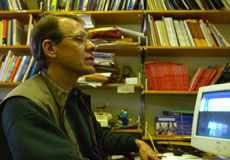Professor broadcasts Spanish culture to campus

Online Poster
Feb 16, 2005
Last updated on May 11, 2016 at 06:59 p.m.
The Spanish radio station, The Latino Radio Service (LRS), is in its second month of broadcasting Spanish-language programs to campus.
The station, broadcast at 1600 KHz on the AM dial, began its format of national and international programs on Jan. 3. Founded by Gary Cziko, professor of educational psychology, LRS receives all of its programming from streamed sources on the Internet.
Cziko first developed the idea a few years ago and tested it by purchasing a transmitter. He first broadcasted from the Foreign Language Building. The signal only covered about two-thirds of the Quad.
“I played around with Internet radio at home but didn’t like to sit in front of the computer,” Cziko said. “I bought a transmitter to play audio from the computer on the radio.”
Get The Daily Illini in your inbox!
He then discovered that the University could run an unlicensed radio station if it only covers the span of campus. Cziko said he decided to have an all-Spanish format because it is the most-spoken foreign language on campus. He currently broadcasts from a transmitter in Bevier Hall.
“I’m interested in using technology to learn about different languages and cultures,” he said.
Cziko hopes the station benefits those on campus who study Spanish.
“I learned Spanish by listening to shortwave radio,” Cziko said. “I knew French before so that helped.”
Since the station is still in its infancy it experiences problems. There is often dead air between programs because of conflicts within the computer software trying to play it.
“Because it stops, people get frustrated,” said Nayeli Fernandez, freshman in LAS. “That needs to be fixed.”
Cziko has taken steps to fix the station’s problems by ordering a newer computer that will allow the software to switch between programs faster. Currently, he is the only broadcast monitor. This means when something goes wrong it is his responsibility to fix it, and problems go unnoticed when he is asleep. Cziko is looking for additional people to help listen to the show and fix problems when they arise.
Fernandez, who listens to the station, said she likes the Spanish music and hopes that the station will pick up newer music aimed at a younger demographic.
Eduardo Garcia, senior in LAS, also listens to the station.
“They mainly have news when I listen to it,” he said. “I’d like a variety of music from different countries and subcultures of Latin America.”
The station does not limit itself to just Spanish-language programs. The station also plays a program broadcast in Portuguese. Cziko said he hopes to incorporate other languages into the station’s programming.
The station broadcasts programs Cziko knows, but he is always looking for more content. The content of the station ranges from Spanish music to news and call-in talk shows, coming in from the Netherlands, Mexico and France.
Cziko also hopes that more locally produced programs will find their way to the station. Currently, LRS plays local programs produced by New Horizons, a group affiliated with the University that discusses Spanish cultural issues. Cziko said it is a possibility that the station could get studio equipment to broadcast live in the future.
“I’m very interested in using technology to make foreign languages more accessible,” Cziko said. “It’s one of the best stations around with good programming. Other stations don’t have a lot of international things.”





